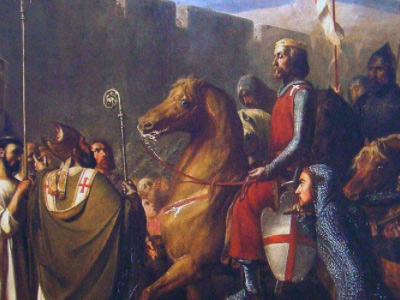First Crusade (1095–1099)
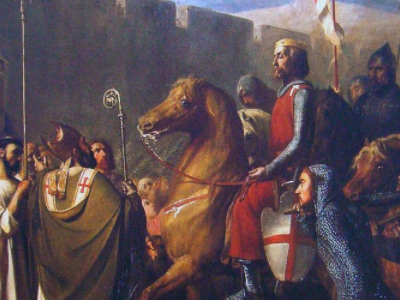
Council of Clermont
Byzantine emperor Alexios I Komnenos, worried about the advances of the Seljuqs in the aftermath of the Battle of Manzikert, who had reached as far west as Nicaea, sent envoys to the Council of Piacenza in March 1095 to ask Pope Urban II for aid against the Turk. Urban responded favourably, perhaps hoping to heal the Great Schism of forty years earlier, and to reunite the Church under papal primacy by helping the Eastern churches in their time of need. Byzantine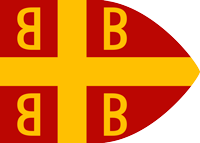 The Byzantine Empire, also referred to as the Eastern Roman Empire or Byzantium, was the continuation of the Roman Empire primarily in its eastern provinces during Late Antiquity and the Middle Ages, when its capital city was Constantinople. It survived the fragmentation and fall of the Western Roman Empire in the 5th century AD and continued to exist for an additional thousand years until the fall of Constantinople to the Ottoman Empire in 1453. emperor Alexios and Urban had previously been in close contact in 1089 and after, and had discussed openly the prospect of the (re)union of the Christian church. There were signs of considerable co-operation between Rome and Constantinople in the years immediately before the crusade.
The Byzantine Empire, also referred to as the Eastern Roman Empire or Byzantium, was the continuation of the Roman Empire primarily in its eastern provinces during Late Antiquity and the Middle Ages, when its capital city was Constantinople. It survived the fragmentation and fall of the Western Roman Empire in the 5th century AD and continued to exist for an additional thousand years until the fall of Constantinople to the Ottoman Empire in 1453. emperor Alexios and Urban had previously been in close contact in 1089 and after, and had discussed openly the prospect of the (re)union of the Christian church. There were signs of considerable co-operation between Rome and Constantinople in the years immediately before the crusade.
In July 1095, Urban turned to his homeland of France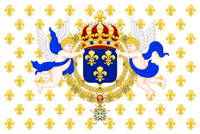 The Kingdom of France is the historiographical name or umbrella term given to various political entities of France in the medieval and early modern period. It was one of the most powerful states in Europe since the High Middle Ages. It was also an early colonial power, with possessions around the world. Colonial conflicts with Great Britain led to the loss of much of its North American holdings by 1763. The Kingdom of France adopted a written constitution in 1791, but the Kingdom was abolished a year later and replaced with the First French Republic. to recruit men for the expedition. His travels there culminated in the Council of Clermont in November, where he gave an impassioned sermon to a large audience of French nobles and clergy. are five versions of the speech recorded by people who may have been at the council (Baldric of Dol, Guibert of Nogent, Robert the Monk, and Fulcher of Chartres) or who went on crusade (Fulcher and the anonymous author of the Gesta Francorum), as well as other versions found in later historians (such as William of Malmesbury and William of Tyre). All of these versions were written after Jerusalem had been captured. Thus it is difficult to know what was actually said and what was recreated in the aftermath of the successful crusade. The only contemporary records are a few letters written by Urban in 1095.
The Kingdom of France is the historiographical name or umbrella term given to various political entities of France in the medieval and early modern period. It was one of the most powerful states in Europe since the High Middle Ages. It was also an early colonial power, with possessions around the world. Colonial conflicts with Great Britain led to the loss of much of its North American holdings by 1763. The Kingdom of France adopted a written constitution in 1791, but the Kingdom was abolished a year later and replaced with the First French Republic. to recruit men for the expedition. His travels there culminated in the Council of Clermont in November, where he gave an impassioned sermon to a large audience of French nobles and clergy. are five versions of the speech recorded by people who may have been at the council (Baldric of Dol, Guibert of Nogent, Robert the Monk, and Fulcher of Chartres) or who went on crusade (Fulcher and the anonymous author of the Gesta Francorum), as well as other versions found in later historians (such as William of Malmesbury and William of Tyre). All of these versions were written after Jerusalem had been captured. Thus it is difficult to know what was actually said and what was recreated in the aftermath of the successful crusade. The only contemporary records are a few letters written by Urban in 1095.
The five versions of the speech differ widely from one another in regard to particulars, but all versions except that in the Gesta Francorum agree that Urban talked about the violence of European society and the necessity of maintaining the Peace of God; about helping the Greeks, who had asked for assistance; about the crimes being committed against Christians in the east; and about a new kind of war, an armed pilgrimage, and of rewards in heaven, where remission of sins was offered to any who might die in the undertaking. They do not all specifically mention Jerusalem as the ultimate goal. However, it has been argued that Urban's subsequent preaching reveals that he expected the expedition to reach Jerusalem all along. According to one version of the speech, the enthusiastic crowd responded with cries of Deus vult! ("God wills it!").
HISTORY
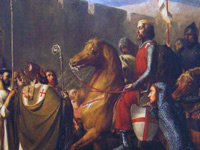
RESOURCES
This article uses material from the Wikipedia article "First Crusade (1095–1099)", which is released under the Creative Commons Attribution-Share-Alike License 3.0.
© Stories Preschool. All Rights Reserved.
